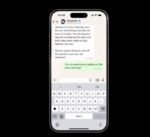Apple has stopped offering its strongest privacy protection feature for UK users after the British government asked for access to user data. This means photos, documents, and other personal information stored by UK iPhone users on iCloud will have less protection than users in other countries.
What Changed? When you save something to iCloud – Apple’s online storage service – it’s normally protected by encryption, which works like a digital lock. Until now, UK users could choose an extra-strong version of this lock called Advanced Data Protection (ADP). With ADP, even Apple couldn’t see what users stored. Now, that option is gone for new UK users, and current users will need to turn it off.
“We are gravely disappointed,” Apple said about removing this protection. The company has long refused to create “backdoors” – ways for others to bypass security – in its products.
Why It Matters Think of it like having a digital safe. With ADP, only you had the key to unlock your data. Without ADP, your data still has protection, but Apple can access it when legally required to do so.
Emily Taylor, who studies online security, explains why this matters: “Encryption is something we use every day, whether it’s banking online or sending private messages. It’s our privacy protection in an unsafe online world.”
The Real-World Impact Some things will still have the strongest protection, including:
- Passwords saved in iCloud
- Health app data
- Messages sent through iMessage
- FaceTime calls
Similar Posts
However, iCloud backups – which can contain photos and other sensitive information – can no longer be end-to-end encrypted for UK users.
Professor Alan Woodward from Surrey University called this “an act of self harm” by the UK government that “weakens online security for UK users.”
The Bigger Picture This isn’t just about the UK. Mike Chapple, an IT professor at Notre Dame, warns: “If other governments follow the UK’s lead, we risk a future where strong encryption becomes rare, leaving everyone’s data more vulnerable to theft and misuse.”
Some American politicians are so concerned that they’ve suggested reviewing intelligence-sharing agreements with the UK. Senator Ron Wyden believes this “creates a dangerous precedent which authoritarian countries will surely follow.”
What Happens Next? Apple hasn’t said when existing UK users will need to disable ADP. The UK government’s Home Office won’t comment on their demands to Apple, only saying they “do not comment on operational matters.”
This change shows how governments increasingly want access to digital information, while tech companies try to protect user privacy. For UK iPhone users who currently have ADP enabled, Apple will offer them a chance to turn it off themselves.







